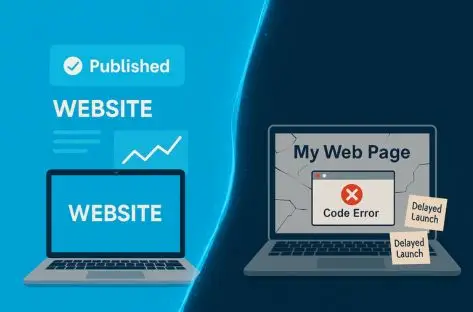Most of us have seen the TV adverts for Build Your Own (BYO) business websites. Showing how easy it is to create a business website in mere minutes, with no technical wizardry required.
A few clicks, a sprinkle of text, a dash of AI magic, and Bob’s your uncle! You’re presented with a fully operational website, poised to connect you with a deluge of new customers. Slap on an e-commerce module, and you can start selling online quicker than you can say “digital marketplace”!
Professional business websites you can build yourself. Sounds great! Right?
Of course it does! What business owner doesn’t want to save money? Especially on something as easy as a website! Not only that, you can do it exactly how you want, without a meddling developer telling you how it should look and operate, and it’s so easy, anyone can do it.
However, before you dive headfirst into the alluring simplicity of these BYO (Build Your Own) platforms, especially if you’re serious about establishing a robust online presence for your business, there are some fundamental aspects you should know about building business websites.
Ignoring these can lead to websites that fail to attract customers and underperform in search engine rankings.
You should know by now that there’s no such thing as a free lunch, and cutting corners at the start can be much harder to recover from down the line, when things go wrong. Of course, I’d like you to talk to us at 127 Media so we can build your dream website for you, and so you’re not left with a DIY nightmare that comes back to haunt you, again and again.
However, should the decision be made to build your own, here are five key things I think all business owners should understand before embarking on building their business websites:
- The Illusion of Effortless Customisation:
While these platforms boast drag-and-drop interfaces and pre-designed templates, the genuine customisation they offer can be surprisingly limited.
You might find yourself shoehorning your unique brand identity into a template that wasn’t quite designed for it. Achieving a distinctive and professional look that sets you apart from the competition often requires delving into code or dealing with restrictive design options.
If your brand has specific visual guidelines or requires particular functionalities, these “easy” builders can quickly become frustratingly inflexible.
- SEO is More Than Just Keywords (Think Google Search Essentials):
Many DIY platforms offer basic SEO features, allowing you to add a few keywords. However, true search engine optimisation is multifaceted, and modern SEO success aligns closely with Google’s Search Essentials.
These guidelines emphasise creating a user-focused website that is fast, mobile-friendly, secure, and accessible. Simply adding a few keywords here and there is unlikely to propel you to the top of search engine results if your site doesn’t adhere to these core principles.
For businesses serious about being found online, a more strategic and comprehensive approach to SEO, keeping Google’s recommendations in mind, is essential. This often requires expertise beyond the capabilities of basic website builders.
- Functionality Limitations Can Stifle Growth:
Out of the box, these platforms offer a certain set of features. But as your business evolves, your website needs might become more complex. You might require advanced contact forms, integration with specific CRM systems, sophisticated analytics tracking, or bespoke e-commerce functionalities.
While some platforms offer app stores or plugin integrations, these can come with additional costs and may not always seamlessly integrate with your existing setup. Consider your future needs and whether the BYO platform you choose can scale with your ambitions.
- You Are Responsible for Everything (Including the Bits You Don’t Understand):
While the platform provides the tools, you are ultimately responsible for the business websites’ performance, security, and maintenance.
This includes ensuring your site is backed up, dealing with technical glitches, and updating software. If you lack the technical know-how, this can be a significant burden and potentially lead to costly downtime or security vulnerabilities.
Professional website developers often offer ongoing support and maintenance, freeing you to focus on running your business.
- Time is Money – Consider Your Core Competencies:
While the initial cost of a BYO website builder might seem appealing, consider the time investment required to learn the platform, design your site, implement SEO best practices (including those outlined in Google’s Search Essentials), and troubleshoot any issues.
Your time as a business owner is valuable. Is it best to use your resources to become a part-time web developer, or would that time be better spent focusing on your core business activities?
Engaging professionals specialising in website design and development, such as 127 Media, can often be a more efficient and ultimately more cost-effective solution in the long run, delivering a website that is both effective and aligned with your business goals.
In Conclusion:
While the promise of quick and easy business websites through BYO platforms is tempting, looking beyond the initial hype is crucial.
For businesses with serious online ambitions, understanding these fundamental aspects, including the importance of Google’s Search Essentials, will help you make a more informed decision and potentially save you time, money, and frustration in the long run. And, like Public Enemy said, “Don’t Believe The Hype.”


